
SATURDAY, JUNE 23, 2018: NOTE TO FILE

The China Connection
Confessions of a Euro-Sinoan
Eric Lee, A-SOCIATED PRESS
TOPICS: LAOZI, FROM THE WIRES, ZHUANGZI, ODUM, SYSTEMS SCIENCE, EAST MEETS WEST
Abstract: While at a conference where scientists from China were well represented, I considered my "China connection" and typed the following. One of the attendees read it, indeed said he read it "many times" which I'll take as a failure on my part to be clear on the first reading. The self-indulgence is likely related to having written this on my birthday.
TUCSON (A-P) — I'm genetically Indo-European, through no fault of my own, meaning my ancestors, after adding some Neanderthal DNA to their genome, domesticated mammals to become livestock to serve their patriarchal empire-building ways. We of the cowboy culture were empowered to spread forth and dominate a vast sea of largely matriarchal, non-empire-building hunter-gatherer types from steppes to shining steppes. When we encountered plant tending agriculturalists, victory was ours saideth our bigger-than-thou's Sky Daddy, though we did add domestic plants and more commoners to our empire-building ways to better empower our dominionism (we were early Anthropocene enthusiasts).
We didn't do the Mesopotamian, Egyptian, or Indus Valley Harappan plant-based empire-building thing, but we conquered or stepped in following collapse from within (e.g. Aryans) to replace those who did, as our One True God subsumed more believing minds than all His predecessor gods and goddesses put together (though Mary survived as a Virgin for a time). Conquering the Americas, Africa, and Asia was an afterthought we did just because we could (being enabled by clever-ape technology and empowered by wood then fossil fuels—and having some germs we were resistant to helped).
Why are Western, educated, industrialized, rich and democratic (WEIRD) societies so weird? What accounts for their independence of thought and other traits, such as a willingness to trust strangers, and follow laws that apply to all humans? What's with their anti-tribalism, the de-normalizing of cousin marriages and ancestor worship? Kinship groupings were reduced to extended families which were then denormalized and broken down into nuclear families, which were then further atomized into dysfunctional individuals, to Beautiful Ones in urban environments doing their own consumer thing. What explains Western WEIRD-ness? Oh, it's what empire-building complex society selects for.
Following the Greco-Roman empire-building phase and five to seven hundred years of environmental restoration (soils, forests, diversity), my remnant hoard ancestors rebuilt a Wood Age in Europe and spread with the wind to build maritime empires, to repeat the Greco-Roman pattern. They sent settlers to Jamestown to continue glass making by turning the well-wooded Eastern North America into charcoal, but that didn't work out for euro-industrial society at the time. Europeans were forced to turn coal into coke to start a Coal Age instead to support the continued growth of modern techno-industrial society.
It was a nasty habit, but burning a planetary larder of fossil fuels enabled continued growth. The priestly and aristocratic agriculturally empowered Feudal System, justified/normalized by the religious control system's God's Mandate (aka Divine Right of Kings) narrative, was replaced by classical then neoclassical economics (and pretend economists) and their Growth's Mandate narrative. The 'best and brightest' at and from Oxford (and other centers of industrial society service providers) built vast cathedrals for the Priestly in Feudal times and later enthroned the economists, eventually agreeing to give them (1968 on) Nobel Prizes for their pretend science (a bank put up the prize money and the best the committee could do was vote to not allow more new prizes no matter how much money was put up to corrupt the system as usual). Our tallest buildings, latter-day cathedrals, served to sanctify our beloved God of Growth ('in Growth We Trust' —Al Bartlett, who understood the exponential function).
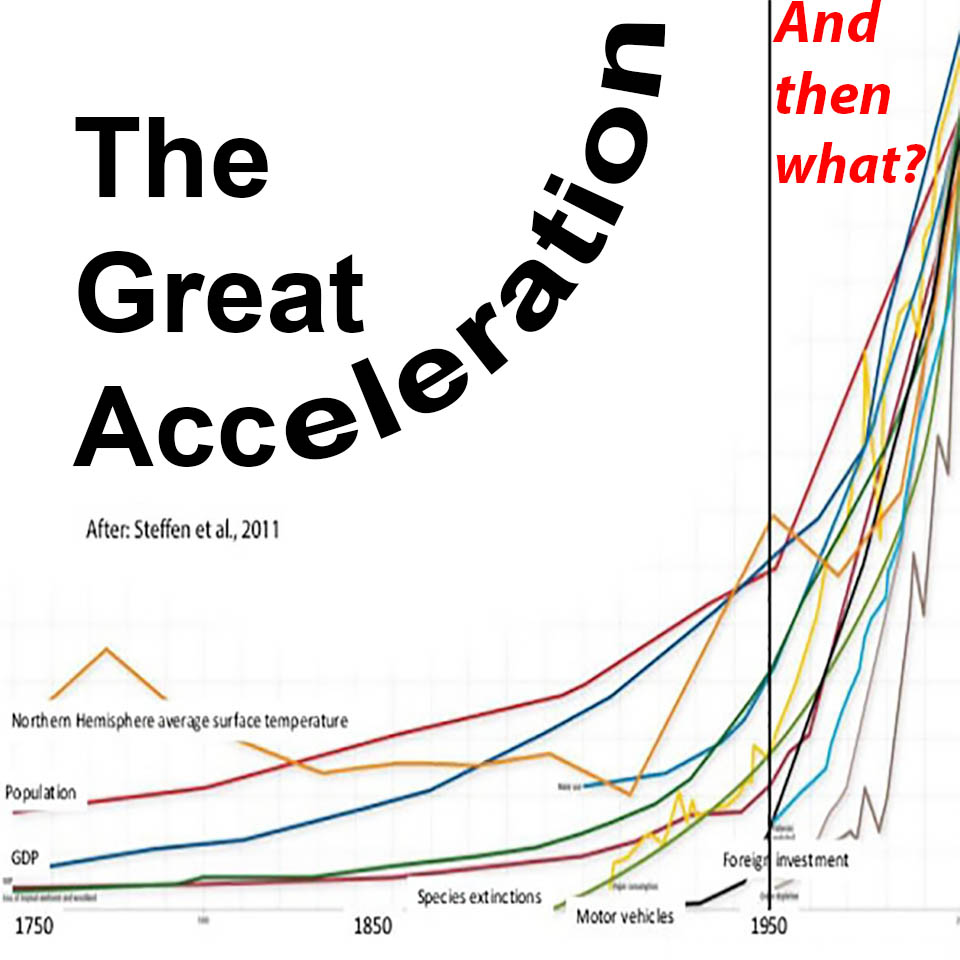 With the Great Acceleration, the interim Americo period, though less than a hundred years as the center of growth, proved irresistible to self-serving elites wherever they found themselves able to serve the growth hegemon. Russia came to produce billionaires and those who served the Chinese Communist Party came to be enriched beyond the dreams of North Koreans before Kim Jung Un decided to sell out and grow the economy. Empire-building became Sino as China came to grow their economy by seven to ten percent per year, to use in three years more concrete than the USA had in its history, as half the coal on the planet was consumed to enable rapid growth. China used 1-4 tons of coal to make 100 watts of solar PV so Americans could feel ever so green—at least those elites who could benefit from the subsidies.
With the Great Acceleration, the interim Americo period, though less than a hundred years as the center of growth, proved irresistible to self-serving elites wherever they found themselves able to serve the growth hegemon. Russia came to produce billionaires and those who served the Chinese Communist Party came to be enriched beyond the dreams of North Koreans before Kim Jung Un decided to sell out and grow the economy. Empire-building became Sino as China came to grow their economy by seven to ten percent per year, to use in three years more concrete than the USA had in its history, as half the coal on the planet was consumed to enable rapid growth. China used 1-4 tons of coal to make 100 watts of solar PV so Americans could feel ever so green—at least those elites who could benefit from the subsidies.
Until my mother died in 2016, the only prescience she could attribute to me was my telling her, while I was a teenager in the late 1960s, that China would one day replace America as the world's goto powerhouse of economic growth and products that all other countries (or their elites) want to be like. I was merely repeating a view I had read somewhere and the idea seemed the height of improbability to most, but in the 1990s she realized I had been right and frequently shared her amazement and my alleged prescience with others.
In my youth I acquired a little red book (I stole it—or rather I told the Santa Maria city librarian I lost it, paid something..., so full confession is I lied to steal it). The Wisdom of Laotse 1948, as translated, edited, and with introduction/notes by Lin Yutang, was the little red book. Yutang was a scientist with an interest in his predecessors, especially Laotse and Chuangtze ("The thought has been constantly on my mind to find a religion that is acceptable to a scientist.") He found one, and as a student of science I found claims that merited consideration. Over the course of a mere lifetime I've paged through the book as the years passed as doing so has payoffs. Some years ago, the book being out of print, I scanned it, ran it through some early ORC software, made corrections, and put the book online so others could benefit. Lin Yutang's introduction and the wisdom of Laotse and Chuangtse (The Zhuangzi: first seven chapters) merit consideration. Confucius was a distraction, but the Neo-Confucians of the Song dynasty (as early systems scientists) made progress as noted recently by Jeremy Lent (The Patterning Instinct: A Cultural History of Humanity's Search for Meaning 2017). For those who haven't read the book yet, consider Jeremy Lent on China: Paraphrased with comments. I have also been helped to climb out of the pit of my Indo-European limitations by considering the teachings of Huang Po, Huineng, and Jianzhi Sengcan, as well as The Teachings of Zhen on Mindful Science.
I never studied Chinese writing, but I did learn a bit of Semantography (meaningful orthography) which was inspired by Charles K. Bliss's study of written Chinese in the late 1940s. Bliss' wife was German, and he (a scientist/engineer) had Jewish ancestors. I probably don't want to know how she got him out of the concentration camp he found himself in, but she did. He was able to make his way to China, but his wife, being German, had to go the other way around the world to be with him. He was impressed that those speaking different languages could yet read and write in Chinese, using it as a shared, regional universal language. He tried to learn the written language, found it unnecessarily complicated, and so invented his own way to write ideographically, spending the rest of his life endeavoring to share it with the world.
Ideas and concepts are things of interest to storytelling animals, more so than what string of phonemes are needed to speak of them in whichever of thousands of languages the recently born are habituated to. So, let's see, a universal easy to learn written language for meaningful communication.... and why not? Oh, it doesn't allow obfuscation, amygdala hijacking of the PFC, or mere eloquence and wordsmithery in the service of demagoguery, but other than that.... 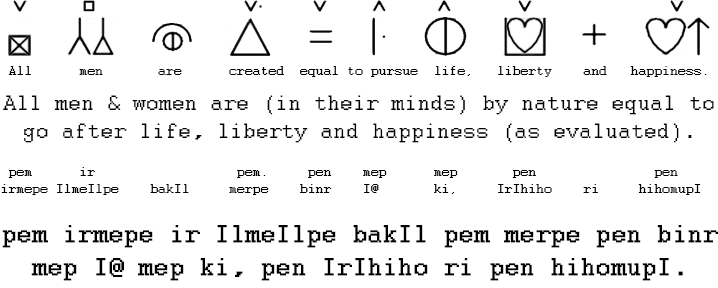 An ability to speak thirteen languages (Murry Gell-Mann included linguistics among his interests, including physics) is far less impressive than thinking well in one, and as Charles Bliss realized, as did Leibniz before him, a written 'algebra of thought' in the form of writable semi-pictographic symbols enables humans to think better ('Thought makes the whole dignity of man; therefore, endeavor to think well, that is the only morality.' — Blaise Pascal). Bliss noted that also being able to speak the symbols would be of some value, but never got around to creating this functionality. A couple of years ago I had a few months of retirement to waste, so I came up with a form of speakable Bliss.
An ability to speak thirteen languages (Murry Gell-Mann included linguistics among his interests, including physics) is far less impressive than thinking well in one, and as Charles Bliss realized, as did Leibniz before him, a written 'algebra of thought' in the form of writable semi-pictographic symbols enables humans to think better ('Thought makes the whole dignity of man; therefore, endeavor to think well, that is the only morality.' — Blaise Pascal). Bliss noted that also being able to speak the symbols would be of some value, but never got around to creating this functionality. A couple of years ago I had a few months of retirement to waste, so I came up with a form of speakable Bliss.
As a student of history I wondered what historians a few hundred years from now would call the empire that arose with the Industrial Revolution, spread globally in the twentieth century, and collapsed in the twenty-first century (or as some might claim 'faded away' in the twenty-second. Well, given that the growth hegemon did shift to the Sino region, the obvious name, analogous to that of the prior Greco-Roman Empire, would be 'Euro-Sino Empire' as while 'Euro-Americo-Sino Empire' might be argued for by outlying American scholars, their hegemony was a mere blip, so surely 'Euro-Sino' would become the accepted term for the empire we live in. We Indo-Europeans, and just about everybody else, with a few exceptions such as the traditional Hopi (which excludes the 'friendlies') and the Kogi (the only complex society not to have been subsumed), is paid to serve the Euro-Sino SYSTEM.
This leads me to another conjecture, that given the greater depth and breadth of Chinese culture (which makes us Indo-European types look like a bunch of self-taught five-year-olds with cars and nuclear bombs), that the Chinese scientists of today, those not overly impressed by Confucian true-believers and Maoist ideologues (or the ideologues to come), represent humanity's best hope that 'eventually we'll have a human on the planet that really does understand it and can live with it properly' (James Lovelock). Laozi was a good start. Time to 'get right with Mother' and learn systems science. The Chinese people have been subsumed by the consumer-producer Euro-Sino growth society, but among their ancestors are true men and women with no title to learn from, they who listened to Nature, the Tao, Aluna, Gaia... that which we are—the environment. Humans would do better to listen to a truly higher power that is not a voice in their heads (and to listen to those who overcame their humancentrism and illusory sense of Self and Other).
I went to the conference of the International Society for BioPhysical Economics at Flathead Lake, Montana, USA in 2017. Chinese science students came the furthest and were present in the greatest number. If the conference in 2019 is not scheduled during their final exams, I hope to see half those present to be from China. Biophysical economics is based on the systems ecology of H.T. Odum who understood the centrality of energy principles humans need to understand for humans to properly understand and live on the planet. In January 2018 I went to the Biennial Emergy Conference, another gathering of Odumites, and about a quarter of those who managed to get to Florida USA were from China.
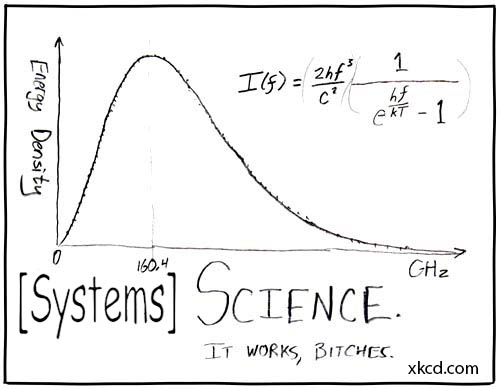 The history of science in the twentieth century and before was largely the history of silo science, of specialists probing Nature, asking Nature questions, and reporting what they see looking through their conceptual microscopes. Odum insisted on 'shocking the scientific establishment into a better view'. He invited us to look through the conceptual macroscope of systems science. Systems science is about connecting the dots/silos. The wisdom of Laozi and Zhuangzi was too. The twenty-first century must be the century when systems science prevails over silo science and silo scholarship. We Indo-Europeans types, with an insignificant number of exceptions, are too clueless; we 'just don't get it'. Odum noted that 'nature has all the answers' and scientists must listen to Nature rather than wordsmiths impressed by their own eloquence—must rather know than believe. The imperative 'must' is mere rhetoric, however, as human extinction is an option. We don't have to do anything. 'Nature is unkind', Laozi, chapter 5, but don't believe a word he says: look around and listen to Nature, bitches.
The history of science in the twentieth century and before was largely the history of silo science, of specialists probing Nature, asking Nature questions, and reporting what they see looking through their conceptual microscopes. Odum insisted on 'shocking the scientific establishment into a better view'. He invited us to look through the conceptual macroscope of systems science. Systems science is about connecting the dots/silos. The wisdom of Laozi and Zhuangzi was too. The twenty-first century must be the century when systems science prevails over silo science and silo scholarship. We Indo-Europeans types, with an insignificant number of exceptions, are too clueless; we 'just don't get it'. Odum noted that 'nature has all the answers' and scientists must listen to Nature rather than wordsmiths impressed by their own eloquence—must rather know than believe. The imperative 'must' is mere rhetoric, however, as human extinction is an option. We don't have to do anything. 'Nature is unkind', Laozi, chapter 5, but don't believe a word he says: look around and listen to Nature, bitches.
Some see China as the closest approximation to Technocracy as envisioned by Hubbert and other technocrats in the early twentieth century. Well, sort of, but we're not playing horseshoes, we're playing a global endgame. A Technocracy movement may not be enough. Something like Technocracy, but with Nature (systems science) as core of the vision, with technology providing cautionary support where able to do more good than harm, may be needed to pass through the bottleneck. The world is now listening to China. Chinese scientists and evidence-based scholars must educate the world, beginning with their leaders (and themselves). Other scientists are willing to merely inform the planners and policy makers of what Nature is telling them, and too many scientists and engineers are willing to let them talk endlessly about 'solutions' while the rest of us fiddle for bread... and meanwhile 'the pace of planetary destruction has not slowed' (David Suzuki 2016). Whose bread we eat, their song we sing.
'Whose bread I eat, his song I sing'. —German proverb, which implies, whose bread we eat, their song we sing, Garrett Hardin, Sweet-Singing Economists, and other servants of the SYSTEM sing the loudest.
'For the first time in history a conviction has developed among those who can actually think more than a decade ahead that we are playing a global endgame. Humanity's grasp on the planet is not strong. It is growing weaker. Our population is too large....' — Edward O. Wilson, Half Earth: Our Planet's Fight for Life 2016
Civilization is the limitless multiplication of unnecessary necessities. —Mark Twain
'Philosophy is a battle against the bewitchment of our intelligence by means of our [Indo-European] language'. — Ludwig Wittgenstein
Hu-mans wake up!
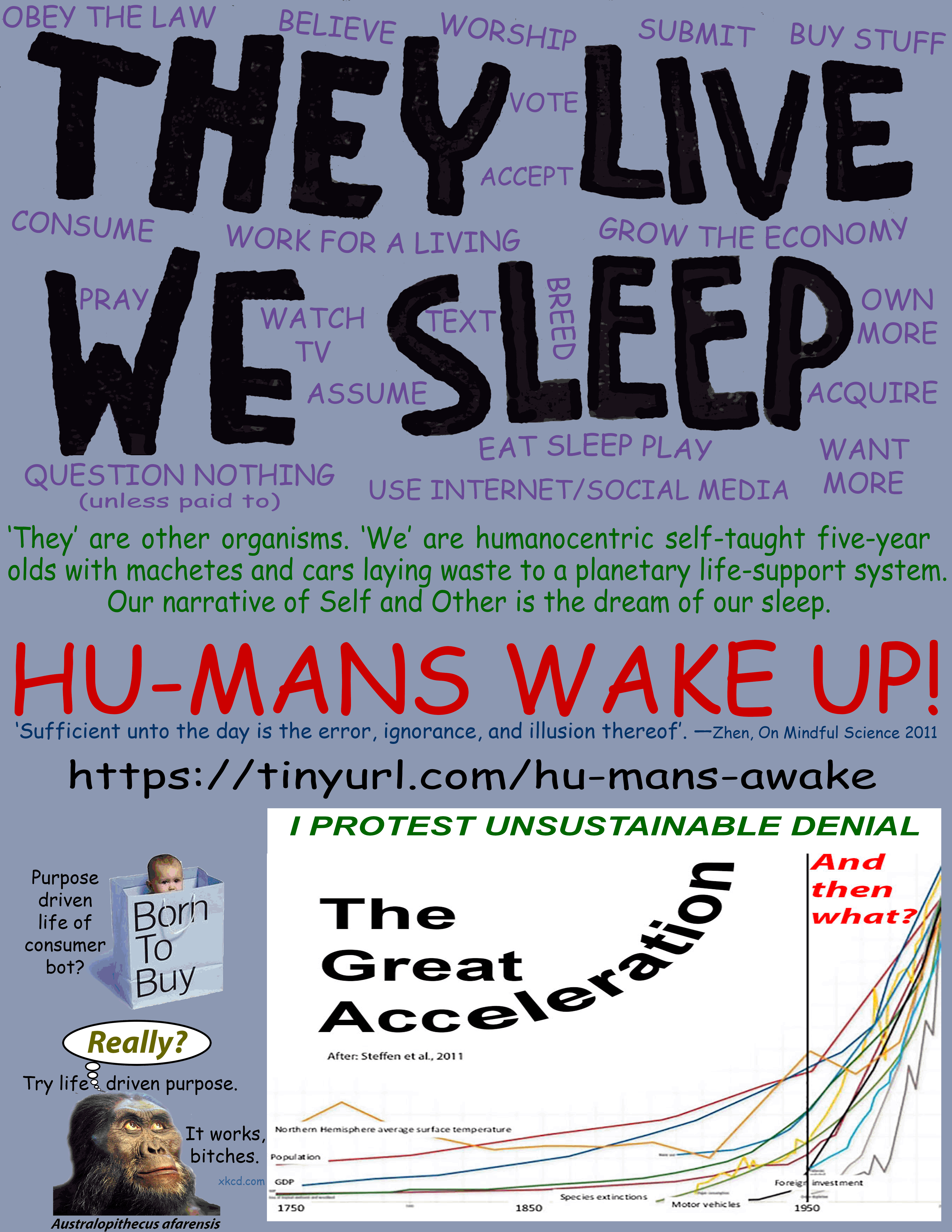 Note: They Live, a cult movie from 1988, included a sign, "THEY LIVE WE SLEEP" where "they" refers to human looking aliens conquering "normals" by stealth and deception like our all too human business-as-usual ideologues and wordsmiths (aka mostly university trained 'true believers') do that we less eloquent true believers pointlessly pick and choose among, like or dislike, based on our deeply held preferences. And how's that been working for us? Swimmingly on the up and up? And then what?
Note: They Live, a cult movie from 1988, included a sign, "THEY LIVE WE SLEEP" where "they" refers to human looking aliens conquering "normals" by stealth and deception like our all too human business-as-usual ideologues and wordsmiths (aka mostly university trained 'true believers') do that we less eloquent true believers pointlessly pick and choose among, like or dislike, based on our deeply held preferences. And how's that been working for us? Swimmingly on the up and up? And then what?
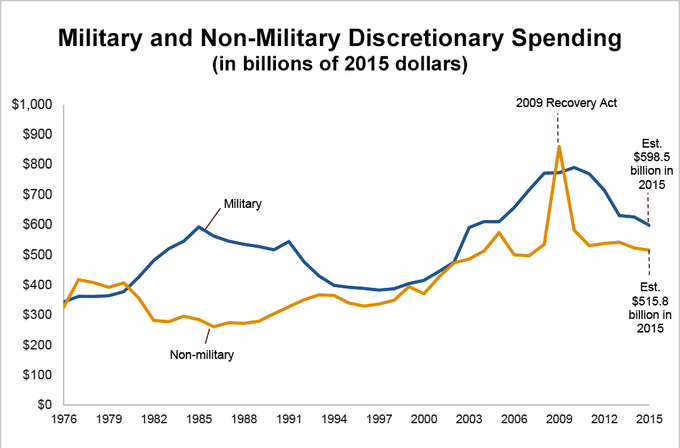 Per US President Jimmy Carter 2019:
Per US President Jimmy Carter 2019:
“...Since 1979, do you know how many times China has been at war with anybody?” Carter asked. “None. And we have stayed at war.” The U.S., he noted, has only enjoyed 16 years of peace in its 242-year history, making the country “the most warlike nation in the history of the world,” Carter said. This is, he said, because of America’s tendency to force other nations to “adopt our American principles.”
"In China, meanwhile, the economic benefits of peace were clear to the eye. “How many miles of high-speed railroad do we have in this country?” he asked. While China has some 18,000 miles of high-speed rail, the U.S. has “wasted, I think, $3 trillion” on military spending [over a half trillion/year]. “It’s more than you can imagine. China has not wasted a single penny on war, and that’s why they’re ahead of us. In almost every way.”
“And I think the difference is if you take $3 trillion and put it in American infrastructure you’d probably have $2 trillion leftover. We’d have high-speed railroads. We’d have bridges that aren’t collapsing, we’d have roads that are maintained properly. Our education system would be as good as that of say South Korea or Hong Kong,”
[Not included above-right: nuclear weapons research, maintenance, cleanup, production, payments in pensions to military retirees and widows/families, interest on debt incurred in past wars, or State Department financing of foreign arms sales and militarily-related development assistance, nor does it include non-military defense spending such as the Department of Homeland Security, counter-terrorism spending by the FBI and intelligence-gathering spending by NSA. Basically nation-state empire-building ended with WWII, so the price of keeping on keeping on has been high. The Sino was the region for the taking in the sixteenth to twentieth centuries for Portuguese, Spanish, British, Russian, American, French and Japanese empire-builders, and after a bit of Mao, was subsumed into the Euro-Sino Empire of commerce to become the center of the Growth Hegemon in the 1990s, growing their economy, stupid, at 7 to 10 percent per year—doubling their growth economy every 7 to 10 years, skipping the nation-state empire-building phase. Established patterns tend to keep on keeping on, however. WWII was a missed opportunity for understanding the dynamics of the world system in terms of what could work in the long-term scheme of things. The intelligentsia today is as clueless (as inecolate) as those who, post-WWII, came up their Universal Declaration of Human Rights and later the Sustainable Development memes to better define how humans, elites and commoners, are to serve the SYSTEM, just as the schoolmen worked 600 years to serve their Feudal SYSTEM.]
